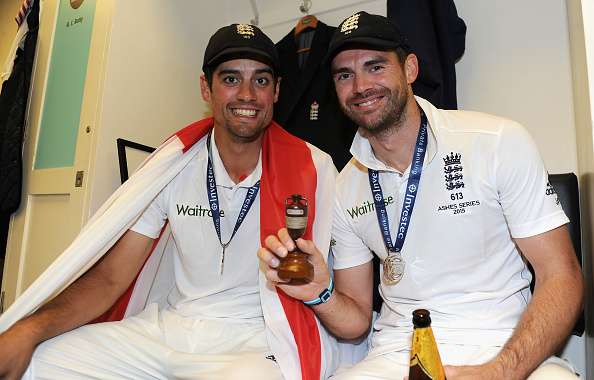Peter Hayter looks at the staggerng feats of Jimmy Anderson and Alastair Cook and asks which one is England greatest player?
That Alastair Cook and James Anderson have been colossal for England is clear and unarguable.
But as their supporters celebrate the Investec series win over Sri Lanka confirmed by victory in the second Test at Chester le Street, and the personal milestones reached by England’s most successful batsman and bowler of all time in the process, what is worthy of debate is which of them will be regarded by history as the greater cricketer.
In terms of statistics, Anderson reaching 450 Test wickets is the rarer feat, and while, assuming this form of the game actually survives the attacks of those wishing to replace it with Monty Pietersen’s T20 circus, both have a chance of becoming the best of the best in their field, the Lancastrian appears more likely to confirm that status first among his seaming peers.
When Cook tucked Nawan Pradeep to mid-wicket for the runs he needed to pass 10,000 in Tests, while he became only the second specialist opener to achieve the feat alongside Sunil Gavaskar and the youngest ever, he joined 11 other batsman on that mark, behind Sachin Tendulkar (15,921), Ricky Ponting, Jacques Kallis, Rahul Dravid, Kumar Sangakkara, Brian Lara, Shivnarine Chanderpaul, Mahela Jayawardene, Allan Border, Steve Waugh and Gavaskar.
All of them are in his sights and there are those who would offer the somewhat unconvincing argument that due to the specific demands of opening the innings the only one to whom he should really be compared is Gavaskar.
But while Cook is as superfit as ever, at his current rate of runs per match (78.45), it would take the Essex man a further 74 of them to overtake Tendulkar, which, at an average of 12 Tests per year would not happen before the summer of 2022, in something like his 202nd Test, aged 37 plus.
With the wicket of Rangana Herath, Anderson became the sixth man to take 450 Test wickets, behind Muttiah Muralitharan (800), Shane Warne, Anil Kumble, Glenn McGrath and Courtney Walsh, but only the third paceman.
And while the record of the Sri Lankan spinner is likely to stand until Colombo freezes over, McGrath’s 563 and Walsh’s 519 appear eminently catchable, meaning the Burnley Express is on schedule to become the most successful fast bowler in Test history.
Anderson needs 68 more scalps to overhaul the Jamaican and 113 to pass the great Australian, which at his rate of wickets per match (3.92), would take him a further 29 Tests and could happen as soon as the summer of 2018, in the scheduled five Test series against India, when he would be a mere 35.
Those are the stats, but what about the players behind them?
Other criteria by which future generations will judge these two firm friends are available and for the purposes of this exercise captaincy has not been taken into account, but for argument’s sake, here are a few thoughts to be going along with.
SKILL: Apart from one period when he tried but failed to reinvent himself, and others when his solid defence has been undermined by uncertainty around off-stump, Cook has stuck to what he is good at, employing three scoring shots; cut, pull, nudge off the hip. Cook is no-one’s idea of Kevin Pietersen, especially not Kevin Pietersen’s. But, thanks to the countless hours of work he and Graham Gooch put into the basics, when everything is in place, his plan to grind down the opposition, force them to bowl to his strengths and pick them off just works.
Anderson’s skill levels are legendary; once his ex-Lancashire coach Mike Watkinson taught him how to swing the ball away from the right-hander, and all attempts to change his action by well-meaning but misguided biomechanists were discarded, he was able to concentrate on mastering the arts and crafts of swing bowling, inventing the wobble-seam ball to try and make himself more effective down under. In England, when he hits his length, he can be devastating because in and out swing are delivered with no change in wrist position or action. Rating (out of ten): Cook 6, Anderson 8.
TEMPERAMENT: Both men are determined, driven, tough as granite and hate losing. Cook, who admitted that, until recently, his greatest motivation had been fear of failure, had to take a ridiculous amount of flak over the call to sack KP, but even when the bombs were going off all around him he never wavered from his conviction that it was the right thing for the side, nor did he attempt to pass the buck for the decision. In his darkest days he considered packing in the captaincy but insisted “I’ve never been a quitter” and is gaining his rewards. Unflappable with the bat, able to sustain concentration by hitting the dimmer-switch between deliveries, his sang-froid means sledging is an utter waste of time.
Inside Anderson Dr Jekyll seems finally to have got the upper hand over Mr Hyde (famous last words) and as a consequence, not only is all that wasted steam he once believed he needed to fire himself up being harnessed for better use, the absence of scowling makes for much more palatable viewing. Since becoming the leader of England’s attack he never once took his place for granted and was so riled when former coach Andy Flower rested him for a Test against West Indies in 2009 that it took him days to recover.
The reasons he celebrates every wicket as though it’s his first (inwardly, if not always on the outside) is because it feels as good. Rating: Cook 9, Anderson 7.
CONSISTENCY: Since Anderson’s career began in earnest in March 2008, when former England coach Peter Moores trusted him and Stuart Broad to replace Steve Harmison and Matthew Hoggard as England’s first choice new ball pair, neither man has ever been dropped, but Cook’s struggles with form have left him vulnerable twice. Most recently his century against West Indies in Barbados in April 2015 was his first for two years. Previously, in 2010, a poor run of form left him a bad match away from being dropped with ex-coach Duncan Fletcher one of many calling for his head. But a hit-or-bust century against Pakistan saved him and he repaid the faith with his incredible Ashes tally of 766 runs at 127.67. Take that series away, however, and his average against Australia drops to 27.36. Brilliant in Asia, he would have liked a better return against South Africa than 35.54.
For Anderson, an explosive start in 2003 was followed by frustration and confusion over his action and the danger of talent left unfulfilled. But even though doubts have been raised on a regular basis about whether his pace is dropping, or his effectiveness away from home conditions, since restarting his career in the second Test of the ’08 series against New Zealand in Wellington he has never been dropped and his year-on-year returns have been spectacular – 46 wickets in ’08, 40 in ’09, 57 in ’10, 35 in ’11, 48 in ’12, 52 in ’13, 40 in ’14 and 46 in ’15 with 25 so far this year including 18 in two Tests against Sri Lanka. When asked about latest milestone one of his answer is that all he wants to do is bowl well enough to deserve selection. Even now, he really means it. Rating: Cook 7, Anderson 7.
FITNESS & STRENGTH: Cook is the fittest man in the England squad, rightly proud of his status as undefeated champion of their yo-yo fitness Test (formerly Bleep), a title he has held ever since he made his Test debut 11 years ago, and regularly winding down after a day in the field with a five kilometre treadmill run. His stamina is remarkable as is the fact that he simply does not sweat. He has missed one Test through injury when a severe case of Delhi Belly on the morning of the Mumbai Test in 2006 ruled him out for the first and only time in a decade of playing for England.
For a man told he must change his action drastically or face a premature end to his career, and a pace bowler to boot, Anderson’s attendance record is extraordinary. Of 103 Tests England have played in the almost eight years since he returned to the side he has missed just three because of injury. Rating: Cook 10, Anderson 10.
INDISPENSABILITY: Leaving aside the captaincy, which of the two is the player England could least do without ? Before and after the retirement of Andrew Strauss (but particularly after) England have relied far too heavily on Cook’s runs and the comings and goings of his prospective partners underline the point. Stuart Broad’s occasional brilliance has won Tests for England (last summer at Trent Bridge, the Ashes), but where would they have been without Anderson’s wickets? Rating: Cook 7, Anderson 8.
TOTAL: Cook 39/50. Anderson 40/50.
I thought I would be able to separate them. I did, by a fag paper. It is impossible to predict it with any degree of certainty whether either will go on to be the best of the best in their field. But one thing is sure; England know how fortunate they are to have had them
This piece originally featured in The Cricket Paper, Friday June 3 2016















